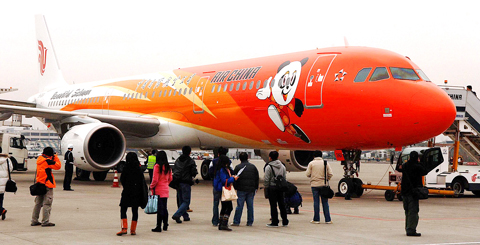The Taipei City Government confirmed yesterday that the two giant pandas will arrive in Taipei next Tuesday.
Taipei City Government spokesman Yang Hsiao-tung (羊曉東) announced yesterday afternoon that the two pandas are scheduled to be sent to Taiwan on Dec. 23, and will be escorted to the Taipei City Zoo directly from the airport for a one-month quarantine period.
Yang flew to Sichuan on Monday to discuss the transportation of the two pandas, a gift from the Chinese government. He announced the decision after negotiations with officials at the Giant Panda Habitat in China’s Wolong Nature Reserve.

PHOTO: CNA
The city government will seek to open the panda hall to the public during the Lunar New Year holidays, Yang said yesterday from Sichuan.
Meanwhile, EVA Airways (EVA,長榮航空) announced yesterday it had volunteered to be the carrier to fly the pandas to Taiwan.
“We are offering this service free of charge,” said EVA spokesperson Nien Kuo-wei (聶國維), adding that transport costs were huge.
Nien said that a 400-passenger Boeing 747 freight aircraft will be used. The aircraft will be grounded on Friday for cleaning and inspections, he said.
Nien said that pandas would be placed in the spacious freight cabin, equipped with an air-conditioning system controlling both the humidity and the temperature inside. The caretakers from Sichuan will prepare the pandas’ meals on the plane, he said.
“We will apply for permission from the Civil Aeronautics Administration for the special charter flight service,” Nien said.
The plane will leave for Chengdu on Sunday, Nien said.
Nien said that the airline has a proven record of transporting special goods, including koalas and paintings.
Aside from the caretakers, government officials and the press from Taiwan and Sichuan, the airline plans to cover the costs of the flight by opening it up to 100 members of the general public who want to take the charter flight with the pandas.
Nien said passengers can choose either a two-day or four-day tour package. The tour costs NT$9,900 per person, including tax.
Meanwhile, Democratic Progressive Party (DPP) Taipei City councilors yesterday condemned China for failing to observe international provisions in issuing the export permit for the transfer of the two creatures, and belittling Taiwan’s sovereignty by refraining from having its national title on the documents.
Importing pandas is subject to the Convention on International Trade in Endangered Species (CITES), a treaty that protects endangered and threatened plant and animal species from overexploitation by regulating their trade.
China, however, issued a “permit certificate for import/export and re-export of wild fauna and flora” of the People’s Republic of China, and put “Chengdu,” a city in Sichuan Province, rather than “China,” in the “country of origin” column, according to a copy of the document showed by the councilors.
“The country of import was ‘Taiwan Taipei,’ but the country of export was only a city in China. It is belittling the sovereignty of Taiwan,” DPP Taipei City Councilor Yen Sheng-kuan (顏聖冠) said yesterday at the Taipei City Council.
DPP Taipei City Councilor Hung Chien-yi (洪健益) joined Yen in condemning the Ma Ying-jeou (馬英九) administration and the Taipei City Government for ignoring Taiwan’s sovereignty to receive the pandas.

An undersea cable to Penghu County has been severed, the Ministry of Digital Affairs said today, with a Chinese-funded ship suspected of being responsible. It comes just a month after a Chinese ship was suspected of severing an undersea cable north of Keelung Harbor. The National Communications and Cyber Security Center received a report at 3:03am today from Chunghwa Telecom that the No. 3 cable from Taiwan to Penghu was severed 14.7km off the coast of Tainan, the Ministry of Digital Affairs said. The Coast Guard Administration (CGA) upon receiving a report from Chunghwa Telecom began to monitor the Togolese-flagged Hong Tai (宏泰)

EVA Air is prohibiting the use of portable chargers on board all flights starting from Saturday, while China Airlines is advising passengers not to use them, following the lead of South Korean airlines. Current regulations prohibit portable chargers and lithium batteries from check-in luggage and require them to be properly packed in carry-on baggage, EVA Air said. To improve onboard safety, portable chargers and spare lithium batteries would be prohibited from use on all fights starting on Saturday, it said. Passengers are advised to fully charge electronic devices before boarding and use the AC and USB charging outlets at their seat, it said. South

Hong Kong-based American singer-songwriter Khalil Fong (方大同) has passed away at the age of 41, Fong’s record label confirmed yesterday. “With unwavering optimism in the face of a relentless illness for five years, Khalil Fong gently and gracefully bid farewell to this world on the morning of February 21, 2025, stepping into the next realm of existence to carry forward his purpose and dreams,” Fu Music wrote on the company’s official Facebook page. “The music and graphic novels he gifted to the world remain an eternal testament to his luminous spirit, a timeless treasure for generations to come,” it said. Although Fong’s

WAR SIMULATION: The developers of the board game ‘2045’ consulted experts and analysts, and made maps based on real-life Chinese People’s Liberation Army exercises To stop invading Chinese forces seizing Taiwan, board gamer Ruth Zhong chooses the nuclear option: Dropping an atomic bomb on Taipei to secure the nation’s freedom and her victory. The Taiwanese board game 2045 is a zero-sum contest of military strategy and individual self-interest that puts players on the front lines of a simulated Chinese attack. Their battlefield game tactics would determine the theoretical future of Taiwan, which in the real world faces the constant threat of a Chinese invasion. “The most interesting part of this game is that you have to make continuous decisions based on the evolving situation,